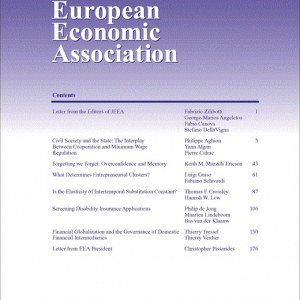
Gautier, P. and Teulings, C. (2006). How large are search frictions? Journal of the European Economic Association, 4:1193--1225.
-
Affiliated author
-
Publication year2006
-
JournalJournal of the European Economic Association
This paper shows that we can normalize job and worker characteristics so that, without frictions, there exists a linear relationship between wages on the one hand and worker and job type indices on the other. However, for five European countries and the United States we find strong evidence for a systematic concave relationship. An assignment model with search frictions provides a parsimonious explanation for our findings. This model yields two restrictions on the coefficients that fit the data well. Allowing for unobserved heterogeneity and measurement error, we find that reservation wages are 25% lower than they would be in a frictionless world. Our results relate to the literature on industry wage differentials and on structural identification in hedonic models. {\textcopyright} 2006 by the European Economic Association.